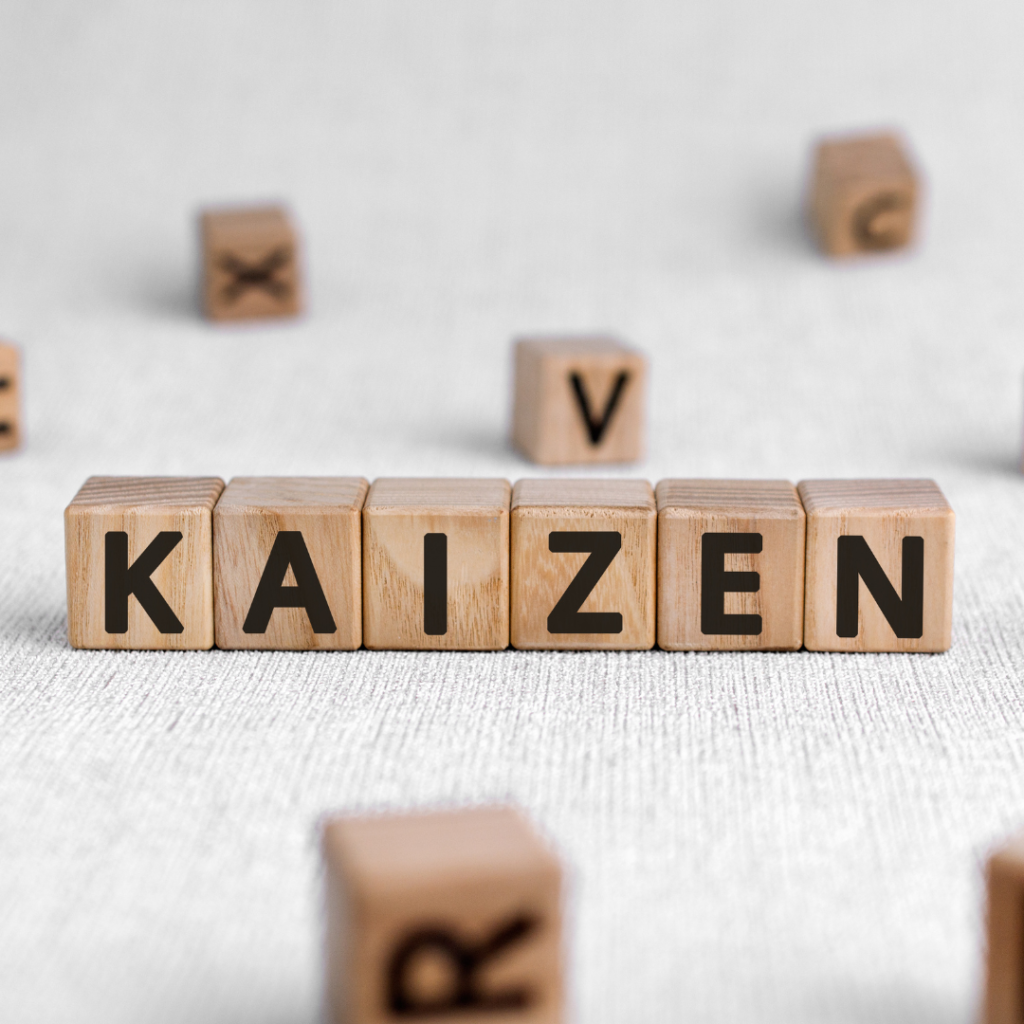In today’s fast-paced business environment, companies are constantly seeking ways to enhance efficiency, reduce waste, and improve overall performance.
One of the most effective approaches to achieving these goals is Kaizen – a Japanese philosophy that emphasises
continuous improvement through small, incremental changes. Unlike large-scale transformations that require significant investment and time, Kaizen fosters a culture where every team member is involved in making small, ongoing improvements that lead to substantial long-term benefits.
What is Kaizen?
The term Kaizen translates to “change for the better” and is built upon the idea that consistent, small changes contribute to significant enhancements in business processes. Originally developed in Japan’s manufacturing industry, Kaizen has since
been widely adopted across various industries, including healthcare, finance, and service sectors. The core principles of Kaizen include:
Continuous Improvement: Encouraging employees at all levels to suggest and implement small improvements.
Employee Involvement: Recognising that frontline employees often have the best insights into inefficiencies and opportunities for enhancement.
Standardisation: Documenting successful changes to ensure they become part of daily operations.
Elimination of Waste: Reducing inefficiencies such as overproduction, unnecessary motion, and waiting time.
The Benefits of Implementing Kaizen
Adopting Kaizen in a business setting can deliver numerous benefits, including:
Improved Efficiency: Small process improvements lead to streamlined operations and reduced resource waste.
Enhanced Employee Engagement: Employees feel valued and empowered when they actively contribute to process improvements.
Cost Savings: Eliminating inefficiencies reduces operational costs over time.
Higher Quality Outputs: Continuous refinement of processes leads to better products and services.
Agility and Adaptability: Businesses become more responsive to changes in market demands and customer expectations.
How to Implement Kaizen in Your Business
Start with a Kaizen Mindset
Leadership should cultivate a culture that encourages curiosity, innovation, and a willingness to improve. Employees should feel comfortable suggesting changes without fear of criticism.
Identify Areas for Improvement
Begin by assessing current workflows, customer feedback, and operational data. Look for bottlenecks, recurring issues, and inefficiencies that can be addressed through small adjustments.
Encourage Employee Participation
Kaizen works best when employees across all levels contribute ideas. Hold regular brainstorming sessions, implement suggestion systems, or use daily stand-up meetings to discuss potential improvements.
Implement Changes in Small Steps
Rather than making drastic changes, introduce minor modifications and test their impact. This iterative approach minimises risk and ensures that changes align with business objectives.
Measure and Standardise
Once a change proves beneficial, document it and incorporate it into standard operating procedures. This ensures that improvements become part of everyday workflows and are not lost over time.
Continuously Review and Improve
Kaizen is an ongoing process. Regularly review performance metrics, gather employee feedback, and refine processes to sustain long-term success.
Real-World Example of Kaizen in Action
A well-known example of Kaizen implementation comes from Toyota, which integrates Kaizen into its Toyota Production System (TPS).
By encouraging workers to suggest improvements on a daily basis, Toyota has consistently enhanced efficiency, minimised waste, and maintained its reputation for high-quality manufacturing. Similar principles can be applied in any business setting to drive continuous improvement.
In Conclusion
Kaizen is a simple yet powerful philosophy that helps businesses achieve sustainable success through small, ongoing improvements. By fostering a culture of continuous improvement, involving employees in problem-solving, and making incremental changes, organisations can enhance efficiency, reduce costs, and improve overall performance.
Whether you’re running a small business or managing a large enterprise, embracing Kaizen can help you stay competitive in an ever-evolving marketplace. Start small, be consistent, and watch the big results unfold!
Are you ready to implement Kaizen in your business? Contact us today at enquires@redjam.co.uk or head on over to LinkedIn to learn how we can help you integrate continuous improvement strategies into your operations!

